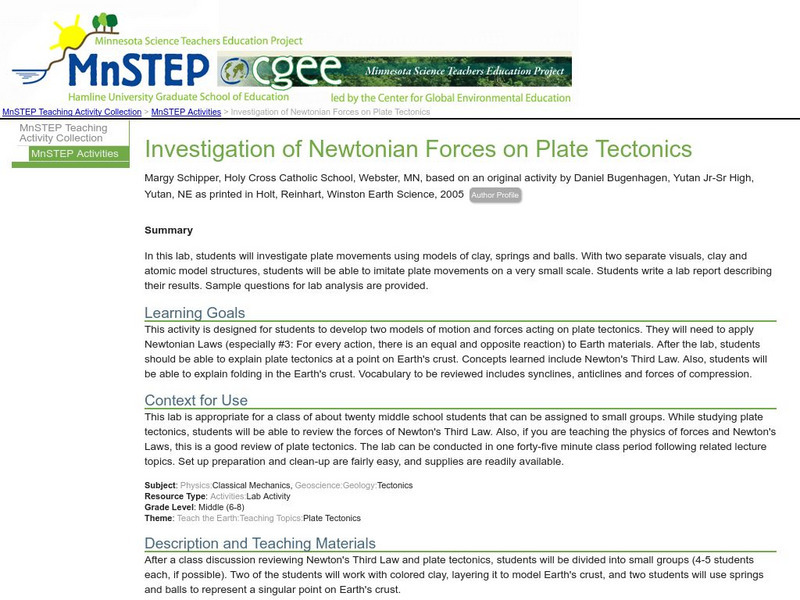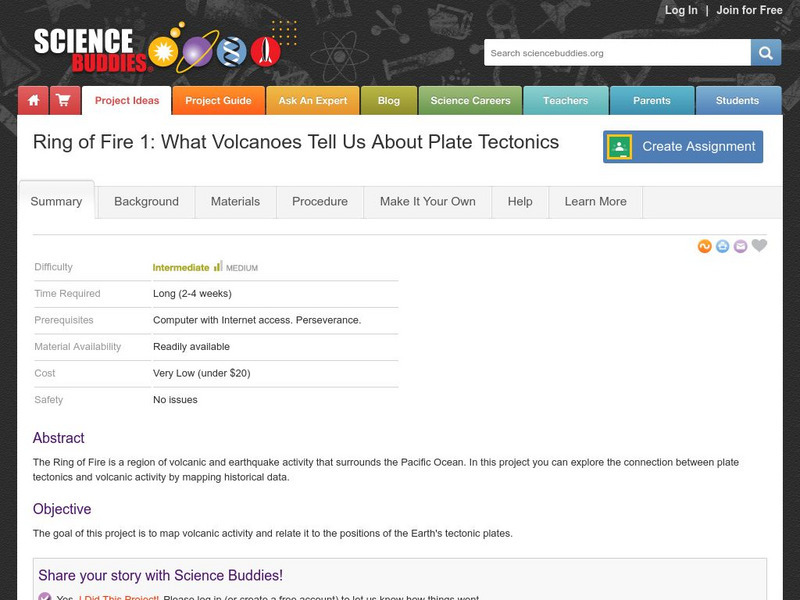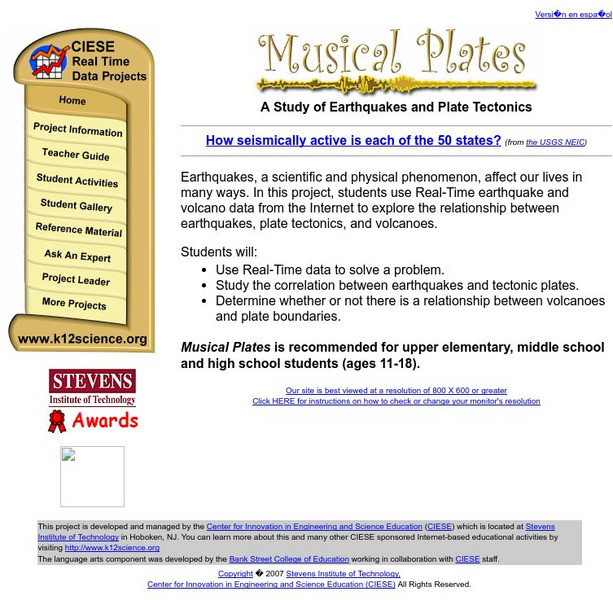Hi, what do you want to do?
Curated OER
Making Craters
Students study craters and identify the different things that characterize craters. In this crater lesson students create a model of an impact crater.
Curated OER
What's The Difference?
High schoolers identify geologic features that are associated with volcanoes. For this volcanic exploration lesson students compare and contrast convergent and divergent volcanoes and are able to explain why some erupt more...
Curated OER
Island formation
Students explain what an island is, and distinguish islands from similar landforms. They compare and contrast the different ways in which islands are formed.
Curated OER
The Physical Geography of South Asia
Students describe the physical forces that formed and shaped the Himalaya, then discuss the physical geography of Mount Everest and how it influences the routes climbers take to the summit.
Curated OER
How Volcanoes Grow
Learners study volcanoes including rock fragments, ash, aerosols and gases. In this volcano lesson students divide into groups and build models of the three major types of volcanoes.
Curated OER
Plotting Earthquakes
Young scholars, after plotting earthquake locations on the map, should correctly; identify the pattern of earthquake locations and identify the ring of fire.
Curated OER
Introduction to Geology Quiz Worksheet
In this earth science fill-in-the-blank worksheet students complete 8 questions about an geology. They see a picture of a rock and a volcano on the page. They check their work with the word bank at the bottom of the page.
Curated OER
Earthquakes
Students observe the melting of ice. For this phase change lesson, students observe ice as it melts. They discuss the process and create a Venn diagram comparing water and ice.
Curated OER
Natural Disasters
Students work together in groups to travel throughout the room to different stations. They practice making different natural disasters at each station. They also examine fault lines and the supercontinent Pangaea.
Curated OER
Volcanoes
Students explore the formation of volcanoes. In this earth science lesson, students build their own volcanoes in the lab using different materials. They identify the different types of volcanoes.
Curated OER
Going to Extremes
Young scholars compare and contrast Archaea with bacteria and other organisms. In this ocean lesson students complete diagrams.
Curated OER
This Life Stinks!
Learners explore the process of chemosynthesis and contrast this process with photosynthesis. They consider the relevance of chemosynthesis to biological communities in the vicinity of cold seeps.
Curated OER
This Old Tubeworm
Young scholars explain the process and significance of chemosynthesis. They develop their own graphic based on data of a biological community. They estimate the age of a given species as well.
Curated OER
World's Most Dynamic Force
Students explore the Earth's forces. They review an assessment task and its accompanying rubric. They classify ten items as long-term or short-term interactions of the Earth's components and rank the destructive impact of the forces. ...
Curated OER
A Moving Experience
Learners visit Time Machine's San Francisco Earthquake Era. They understand how the Earth's layers interact to cause changes in the Earth's surface. They review information about earthquakes and Earth's layers.
Science Education Resource Center at Carleton College
Serc: Investigation of Newtonian Forces on Plate Tectonics
An investigation for students to understand plate tectonics by using models to see how motion and forces act on the plates. Students can use these models to see the connection between Newtonian Laws to Earth materials. Lesson plan...
TeachEngineering
Teach Engineering: Earthquakes Living Lab: The Theory of Plate Tectonics
Working in pairs, students think like engineers and connect what they understand about the theory of plate tectonics to the design of structures for earthquake-resistance.
Annenberg Foundation
Annenberg Learner: Dynamic Earth Interactives: Plate Tectonics
The resource explores the Earth. There are tutorials on plate tectonics, plates and boundaries, and the Earth's structure. There is also an introduction and an interactive activity to test the students on skills taught.
Science Buddies
Science Buddies: Ring of Fire 1: What Volcanoes Tell Us About Plate Tectonics
The Ring of Fire is a region of volcanic and earthquake activity that surrounds the Pacific Ocean. In this project you can explore the connection between plate tectonics and volcanic activity by mapping historical data.
US Geological Survey
Us Geological Survey: Ring of Fire & Plate Tectonics
A massive amount of information on the Ring of Fire and plate tectonics. There are links to graphics and text. The volcanoes in the Ring of Fire are discussed in detail by area.
CK-12 Foundation
Ck 12: Earth Science: Evolution, Plate Tectonics, and Climate Change Study Guide
[Free Registration/Login may be required to access all resource tools.] Summarizes the key points about three theories in Earth Science: the theory of evolution, the theory of plate tectonics, and the theory of climate change due to...
Center for Innovation in Engineering and Science Education, Stevens Institute of Technology
Ciese: Musical Plates: A Study of Earthquakes and Plate Tectonics
This activity has students access USGS earthquake information to plot the their locations on a world map. Doing this will help students discover for themselves the boundaries of tectonic plates.
CK-12 Foundation
Ck 12: Plate Tectonics and Seas of the Paleozoic and Mesozoic Era Study Guide
[Free Registration/Login may be required to access all resource tools.] Provides a brief overview of plate tectonic activity during the Paleozoic and Mesozoic eras and the changes in sea level that occurred. Includes some questions to...
CK-12 Foundation
Ck 12: Fourth Grade Science: Earth Science: Theory of Plate Tectonics
[Free Registration/Login may be required to access all resource tools.] Discusses what a tectonic plate is and how scientists can recognize its edges, how the plates move by convection in the mantle, the three types of plate boundaries...
























